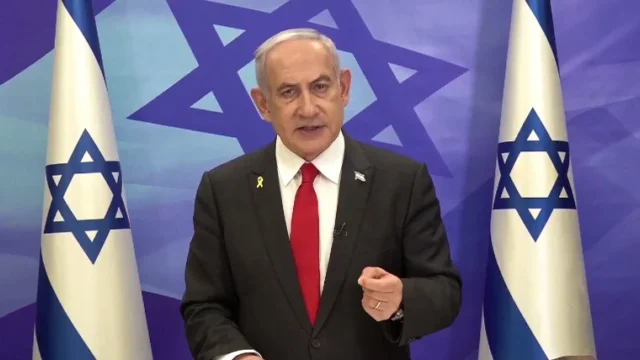The elimination of Yahya Sinwar improved the already-joyful Sukkot holiday for millions of Israelis and Jews and their supporters around the world. In all likelihood, it will also irritate President Joe Biden, as the Hamas leader was killed in Rafah, where he demanded Israel not enter under threat of an arms embargo and a warning by Vice President Kamala Harris that it was impossible.
Israel, wisely, didn’t listen.
It will also irritate Qatar, a regional partner of both Iran and the United States. Qatar has been hosting Hamas leadership in very swanky quarters in Doha while insisting that Sinwar, hiding under the ravaged streets of Gaza, held the key to a hostage release. If he ever did, he no longer does.
And Iran will be shaken by one more setback in its pursuit of victory in a broad religious war against Israel and the United States and their allies.
How did we get here? A reminder is useful: The Hamas orgy of rape, torture, mutilation and murder was accompanied by the transport of 241 people from Israel to the Gaza Strip — most living, some already dead. According to the International Humanitarian Law Database, hostage-taking is a war crime.
The Israeli Defense Forces (IDF) entered Gaza with guns blazing — destroying vast tunnel networks and military facilities that Hamas had built under the civilian population of Gaza City (also defined as a war crime under IHL). One of the announced aims of the IDF entry was the return of the hostages.
The U.S. was, apparently, unhappy with the intensity of military operations. In early November, Secretary of State Antony Blinken suggested that Israel use “smaller bombs,” try “targeted assassinations,” and offer Hamas a “humanitarian pause.” Israel declined the first two on military grounds and said the third was only possible after the hostages were released.
Set back on its heels, Hamas released 117 hostages to Israel in exchange for a one-week ceasefire at the end of November.
The point should have been made. Hamas under serious military pressure behaves differently than Hamas when it is protected politically.
But politics ruled. The U.S. and Qatar pursued “hostage negotiations,” pressing Israel to trade a ceasefire for the illegally imprisoned, tortured and sometimes-murdered prisoners. Nothing happened. The U.S. pressed Israel harder, becoming more and more shrill about bribing the incubuses — including offering a permanent ceasefire and a guarantee that Sinwar would not be assassinated. Similar pressure appears not to have been levied on Hamas, although Israel obviated the possibility by eliminating Hamas political chief Ismail Haniyeh in June.
Finally, in June, the U.S. blamed Hamas for the stalled talks. But by August, Hamas declared it was “losing faith” in the U.S. as a mediator, and later that month, Blinken came to Israel to demand that it do more to reach a deal.
In September, Hamas murdered eight hostages in a manner that won’t be described here. It put a bit of a damper on what was called “U.S. optimism” by NBC News, which quoted irritated U.S. officials suggesting that “Netanyahu’s public comments had complicated things, saying that ‘staking out concrete positions in the middle of a negotiation isn’t always particularly helpful.’”
Why does it matter now? Sinwar’s gone, right?
It matters because the larger regional war continues, and Iran has bigger plans.
Mahmoud Abbas, the Palestinian Authority (PA) strongman based in Ramallah, has been under attack by Iranian-backed Hamas for years. Iran wants to take both the West Bank and Jordan — removing two Sunni strongholds, one of which is ruled by a direct descendant of the Prophet Mohammad — and replace them with the terrorist, fundamentalist Muslim Brotherhood (Hamas) on both sides of the Jordan River. The Sunni Gulf States, Israel’s Abraham Accords partners and Saudi Arabia, are under similar Iranian pressure. The U.S. is under direct attack by the Houthis in the Red Sea and by Iranian-backed Shiite militias in Iraq.
The war won’t end with Sinwar’s elimination, but now Khaled Mashal, living in a Doha luxury hotel, is the last credible Hamas leader. Doha can’t pretend the delays are based in Gaza. That makes this a perfect time to add to Iran’s discomfiture after the decimation of Hezbollah’s leadership in Lebanon and the continuing unraveling of Hamas’ capabilities.
The U.S. should, first and foremost, press Qatar to press Mashal to surrender. Unconditionally. And to authorize the release of the remaining hostages.
Prime Minister Benjamin Netanyahu has laid out a rather gracious marker, considering the torment of his own citizens in Gaza in the past twelve months: “To those holding our hostages, I say: whoever lays down their weapons and returns our hostages — we will enable them to leave alive. At the same time, I say: Anyone who harms our hostages — their blood will be upon their own head. We will hold them to account.”
Seems fair.
And after that, the rest of the region awaits liberation.


